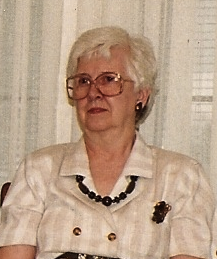 |
| Mom |
When Mom died, I knew I had lost more than my mother. I had lost the one person I knew prayed for me every day, whether I needed it or not. I had spent a lot of time poo pooing Mom's advice that the solution to any problem was prayer. I remembered, because she reminded me of it often, that I had stopped biting my nails when I was about six after I prayed to God for his help. I don't think I would have remembered those prayers if Mom hadn't reminded me. But she was right. With her encouragement, I had prayed that God would help me stop biting my nails, and I stopped.
But I also thought that with Mom's death, my guardian angel may also be gone. I was more comfortable thinking that I had a guardian angel than thinking Mom's prayers were what kept me safe. And I had a very large number of experiences that I attributed to my guardian angel.
One of the most dramatic set of examples all came from the same summer, a summer when I am certain Mom spent a lot of her praying on me. It was the summer of 1973, a year after I had made several significant decisions. First, it was the year after I decided to get divorced. Or at least I thought that was my decision. Second, I decided to go to graduate school. I didn't know how I was going to pay for it, but I made the decision, and I was accepted. I think I left it up to my guardian angel to figure out the details.
 |
| Image by tyfn, via Flickr |
The summer of 1972, I had travelled by bus from Berkeley, California, to Moorhead, Minnesota, in order to attend my sister's graduation from high school. My husband at the time, Don, couldn't leave as early as I needed to. I wasn't confident enough to consider driving by myself, and the cost of flying was entirely out of the question. A train ticket was twice the cost of a bus ticket, and I wouldn't have arrived any sooner. So I traveled that time by bus.
I didn't consider that trip to be the beginning of the end of my marriage, but that is what it turned out to be. As I entered the bus in Oakland, I tried to convey as sophisticated an image as possible. I thought I was so worldly. But as I walked toward the back of the bus, the strap of my purse caught on the armrest of one of the seats, pulling me backwards as I made my way. I caught myself before falling down, and dusted off my slightly bruised ego, untangled my purse strap, and continued toward the back where I had spotted an empty row. I managed to get my bag stowed above the seat and then I stepped up to sit down. I hadn't noticed that the elevation of the step where the seats were woudn't permit me to stand up. So I bumped my head pretty hard on the overhead ledge which made my landing on the seat quick, and without grace. So much for my sophisticated start on this, my first solo traveling experience.
A gentleman dressed in western clothes, complete with a cowboy hat, asked if he could have the seat next to me. We talked most of the way from Oakland to Reno, our dinner stop. He was a rodeo competitor, on his way to Montana. He invited me to join him for dinner in Reno, a pleasant option to what otherwise would have been a solitary event. After dinner, he excused himself because he wanted to try his luck with the slot machines. I made my way to a bookstore where I bought the book
The Female Eunuch by Germaine Greer.
 |
| Image by Globalism Pictures, via Flickr |
The bus traveled though Nevada overnight with Salt Lake City as our breakfast stop. I don't recall if the cowboy was on the same bus, but I know he wasn't next to me on the next leg, from Salt Lake City to Missoula. Instead, my seat mate was a high school boy who was on his way to a dude ranch in Montana where his dad worked. He spent every summer with his dad, but he spent the school years with his mom. He said his mom had been married five times, so he was used to being around lots of step fathers. I suppose it wasn't all that surprising that he asked me if I liked being married. No one had ever asked me that before. And I'm not sure I had even asked it of myself. I am sure the pause between his asking the question and my answering it was longer than he expected. I think my answer was an equivocal sometimes I liked it and sometimes I didn't. I had already read some of my book before he and I started talking, so I guess I had begun to wonder whether I was happy with all my choices.
By the time I reached Moorhead, I knew the answer to that young boy's question was that I wasn't happy. But that didn't mean I was ready to give up. I called Don and tried to tell him that I wasn't happy, but since I was in my parents' house, I couldn't get the words out. I went upstairs and sat at the desk that had been mine while I was in high school and college, and I decided to write him a letter. When I opened the first desk drawer, I found a paper with my sister's handwriting. It was a copy of Ralph Waldo Emerson's essay, Self Reliance, one of my favorites. And that cinched it. I wrote Don a letter telling him that I was not happy and that when I got back to Berkeley, we had to make some changes. A few days later, after he had received the letter, Don called me at my parents' house and reassured me that we would do something when I got back.
I returned to Berkeley by bus with no memorable traveling companions. When Don picked me up at the bus station, he announced that he had already moved out of our apartment. He proposed that I keep the car and he would take the bicycle. Since I would have the apartment, he would take our tent. And that was the extent of our discussion. He had bought a do-it-yourself divorce book and said he thought that since he had no job, he should file for a no-contest divorce. It was final in February of 1973, the year I am convinced Mom spent a lot of her prayer time on me.
 |
| Image by Will Carter Photography, via Flickr |
I entered San Francisco State University's masters program in January of 1973. At the end of that semester, I packed up everything I owned into my VW bug and drove from San Francisco to Moorhead, to spend the summer with my family. I had already made one round-trip between California and Minnesota since that bus trip. This time, I drove 2,198 miles across country without a problem. But when I was two miles from home, at the off ramp of I-94 and 8th Street South in Moorhead, my car blew a piston and stopped dead at the stop sign. It was bad news, but delivered with the softest possible blow. How else could I explain my car not breaking down earlier but to attribute it to a guardian angel?
I took my bike off the rack at the back of my car, reinflated the tires, rode down 8th street to the first gas station I could find and arranged to have the car towed to my parents. Eventually, I got my VW to a shop that specialized in repairs to foreign cars. The estimate for the repair: $120. I knew I needed $60 to get back to San Francisco at the end of the summer. I had $180 in my pocket when I arrived in Moorhead. It seemed like another act on the part of my guardian angel.
 |
| Image by Eva Luedin, via Flickr |
That summer, I spent most of my time driving a man from Bolivia, Ruben, from farm to farm in the Red River Valley. He had been brought to the area by his brother to serve as a Lutheran missionary to the migrant workers. But he spoke no English and he couldn't drive. I was his driver and translator for the summer. I had received no salary, but the organization sponsoring Ruben agreed to pay for my gas. That meant I would still have the $60 I needed to get back to California.
At one point that summer, as I was driving along a gravel country road, Ruben saw some workers in the field and he asked me to pull over so he could talk with them. It looked like there a shoulder, so I pulled over -- onto tall grass. I felt my car beginning to roll, but instead of continuing down the ditch, it came to a gentle rest against a sign that warned of an upcoming curve in the road. Once I realized what had happened, I looked up and down that country road and could not see another sign. How else could I explain that I chose that spot to pull over but to consider it the work of my guardian angel?
 |
| Image by jimforest, via Flickr |
There are many more examples of bad things happening in my life, but in the least possible harmful way. I have continued to give my guardian angel credit for these events, though I have also always thought Mom and her prayers were that guardian angel. I still think she is.






.jpg)












